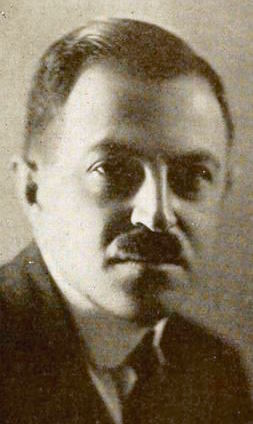Related Research Articles

Fleischer Studios was an American animation studio founded in 1929 by brothers Max and Dave Fleischer, who ran the pioneering company from its inception until its acquisition by Paramount Pictures, the parent company and the distributor of its films. In its prime, Fleischer Studios was a premier producer of animated cartoons for theaters, with Walt Disney Productions being its chief competitor in the 1930s.

Max Fleischer was a Polish-American animator and studio owner. Born in Kraków, in Austrian Poland, Fleischer immigrated to the United States where he became a pioneer in the development of the animated cartoon and served as the head of Fleischer Studios, which he co-founded with his younger brother Dave. He brought such comic characters as Koko the Clown, Betty Boop, Popeye, and Superman to the movie screen, and was responsible for several technological innovations, including the rotoscope, the "follow the bouncing ball" technique pioneered in the Ko-Ko Song Car-Tunes films, and the "stereoptical process". Film director Richard Fleischer was his son.

Betty Boop is an animated cartoon character designed by Grim Natwick at the request of Max Fleischer. She originally appeared in the Talkartoon and Betty Boop film series, which were produced by Fleischer Studios and released by Paramount Pictures. She was featured in 90 theatrical cartoons between 1930 and 1939. She has also been featured in comic strips and mass merchandising.

Talkartoons is a series of 42 animated cartoons produced by Fleischer Studios and distributed by Paramount Pictures from 1929 to 1932.

Koko the Clown is an animated cartoon character created by Max Fleischer. His first appearance as the main protagonist in Out of the Inkwell (1918–1929), a major animated series of the silent era. Throughout the series, he goes on many adventures with his canine companion "Fitz the Dog", who would later evolve into Bimbo in the Betty Boop cartoons.
The silent age of American animation dates back to at least 1906 when Vitagraph released Humorous Phases of Funny Faces. Although early animations were rudimentary, they rapidly became more sophisticated with such classics as Gertie the Dinosaur in 1914, Felix the Cat, Oswald the Lucky Rabbit, and Koko the Clown.
Myron Waldman was an American animator, best known for his work at Fleischer Studios.

Out of the Inkwell is an American animated film series of the silent era. It was produced by Max Fleischer from 1918 to 1929 and was called The Inkwell Imps at the end of that period.
Bimbo is a fat, black and white cartoon pup created by Fleischer Studios. He is most well known for his role in the Betty Boop cartoon series, where he featured as Betty's main love interest. A precursor design of Bimbo, originally named Fitz, first appeared in the Out of the Inkwell series.

Dave Fleischer was an American film director and producer who co-owned Fleischer Studios with his older brother Max Fleischer. He was a native of New York City.

U.M. & M. TV Corporation was an American media company best known as the original purchaser of the pre-October 1950 short films and cartoons produced by Paramount Pictures, excluding Popeye and Superman. The initials stand for United Film Service, MPA TV of New Orleans, and Minot T.V.

The Old Man of the Mountain is a 1933 American pre-Code live-action/animated short in the Betty Boop series, produced by Fleischer Studios. Featuring music by Cab Calloway and his Orchestra, the short was originally released to theaters on August 4, 1933, by Paramount Pictures. Calloway voices all of the characters in the cartoon save for Betty herself. Calloway and his orchestra also perform all of the music in the cartoon, including two songs Calloway co-wrote.
Bernard "Berny" Wolf was an American animator and television producer.
Betty Boop's Rise to Fame is a 1934 Fleischer Studios animated short film, starring Betty Boop.
Seymour Kneitel was an American animator, best known for his work with Fleischer Studios and its successor, Famous Studios.

Ha! Ha! Ha! is a 1934 Fleischer Studio animated short film starring Betty Boop, and featuring Koko the Clown.
More Pep is a 1936 Fleischer Studios animated short film starring Betty Boop, and featuring Pudgy the Puppy.

Professor Grampy is an animated cartoon character appearing in the Betty Boop series of shorts produced by Max Fleischer and released by Paramount Pictures. He appeared in nine of the later Betty Boop cartoons beginning with Betty Boop and Grampy (1935). He had a starring role in the "Color Classic" Christmas Comes But Once a Year (1936).
Willard Gustav Bowsky was an American animator best known for his work at Fleischer Studios in New York City and Miami, Florida, where he worked on cartoons featuring Betty Boop, Popeye the Sailor, and Superman, in addition to two feature-length animated films. Fellow Fleischer animator Shamus Culhane described Bowsky as "what one might call a pre-McCarthy, gung ho, all-American Babbitt." He was described as being outspoken with anti-Semitic remarks, but skilled at animating complicated perspective shots and directing many of the jazz-influenced cartoons produced by the studio.

Minnie the Moocher is a 1932 Betty Boop cartoon produced by Fleischer Studios and released by Paramount Pictures.
References
- ↑ Lenburg, Jeff (1999). The Encyclopedia of Animated Cartoons. Checkmark Books. pp. 54–56. ISBN 0-8160-3831-7 . Retrieved 6 June 2020.
- 1 2 Sampson, Henry T. (1998). That's Enough, Folks: Black Images in Animated Cartoons, 1900-1960. Scarecrow Press. p. 196. ISBN 978-0810832503.